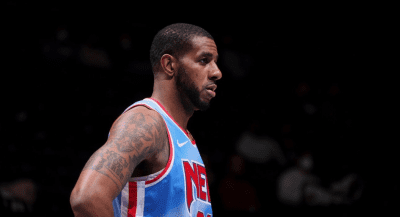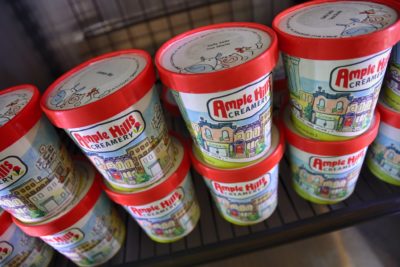Zhe Zhe: A Satirical Web Series Where Nothing Is Sacred
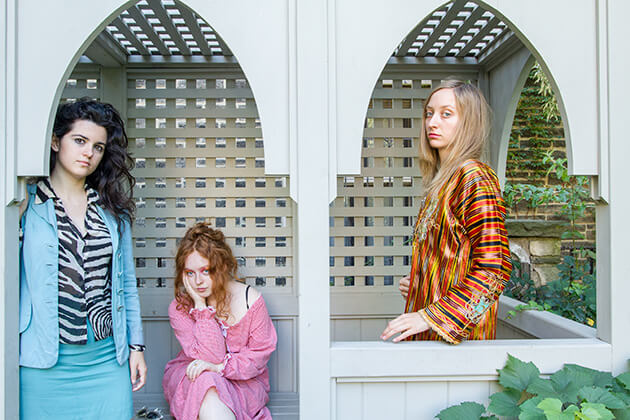

Leah Hennessey, Ruby McCollister, and Emily Allan of “Zhe Zhe”
All photos by Jane Bruce
There’s something going on in Brooklyn and you can’t quite put your finger on it. Is it the barbershops-slash-coffee shops? The gallery shows with mangled underwear stapled to the wall? The tour groups walking around Williamsburg? The corporate ad campaigns telling you to be unique? The serious workshops on how to curate your Instagram account? Everyone has been talking about gentrification, but no one has been talking about this, whatever it is, until now.
Four native New Yorkers—Emily Allan, Leah Hennessey, E.J. O’Hara, and Max Lakner—and Hollywood transplant Ruby McCollister have started the conversation with Zhe Zhe, a sharp, satirical web series where nothing is sacred and for good reason: It’s about time someone said something.
“What do you expect?” says Allan. “We grew up in New York. Look around.” Allan and I are sitting on the floor, on the set of Zhe Zhe, which also doubles as Hennessey’s apartment in real life. It’s a cozy space, with red walls, a red couch, a red Chinese lantern, a red (velvet) ottoman, and a pair of heavy tan curtains with large Chinese characters painted on in black. “We changed the curtains for the set and they never got changed back,” says Hennessey. “I think the end tables were here already.”
Hennessey, O’Hara, and McCollister are sitting on ornate chairs and talking about the day’s events. Earlier, McCollister had had an audition and Allan had been dog-walking in a pair of jeans and a crop top that looked like she had time traveled from 1960s London. “When I was walking, a lot of people were looking at me like I was grooving,” she says, until an old woman “in victory curls” stopped her on the crosswalk. Here, Alan does a old New-Yawker accent: “Oh! I thought you were someone my age.” The room cracks up.
“Were you carrying that book?” asks Hennessey; Alan denies it, and the room cracks up again.
The book is The Origin of Consciousness in the Breakdown of the Bicameral Mind—”a magnet for crazy people,” says Hennessey. It’s a book that all four have read and they quickly dive into a discussion. Later, the conversation seamlessly changes to another book, The Game, before touching on emu farms, analyses of the antics on the MTA subway lines (“On the A train, people are getting their toes painted,” says McCollister), BBC comedies, and Mark Leyner. (“He’s more Zhe Zhe than Zhe Zhe,” says Hennessey. “And we’re obsessed with him.”)
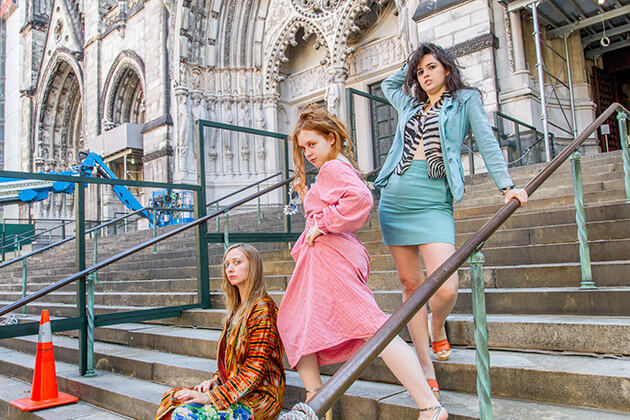

I feel like I’m sitting in a boudoir, simultaneously listening in on the conversation of four friends and also getting a behind-the-scenes look at how Zhe Zhe is made. “The coolest thing about doing Zhe Zhe is that we are really keeping tabs and remembering our inside jokes and things we get obsessed about together,” explains Hennessey. “We have so many running jokes, and if one of us reads a book then we all read the same book. Then we have to watch the movie.
“We’re always sharing media and talking about stuff. With Zhe Zhe, we get to incorporate a lot of that into the show. We all story it together,” she adds.
Without any budget outside of their own earnings, season one of Zhe Zhe got off the ground as a passion project. “It was a lot of borrowed equipment and borrowed resources, and favors,” says Hennessey. “All borrowed locations, which really slowed things down because if we needed a car, we’d have to wait a month for a car.”
For a year and a half, the five friends doubled and tripled in all of the pre- and post productions roles imaginable: director/special effects (O’Hara), cinematographer (Lakner), and “head scribe” (Hennessey), and everyone pitched in to make the costumes and the set props, write the music, and DIY-it for hours at a time. “We’ll all show up here at like 7am and then we’re shooting and working at least until 7am, twenty-four hours later,” says Hennessey.
The first season opens with Mona DeLiza (McCollister) and Jean D’Arc (Hennessey) getting ditched by their Zhe Zhe bandmate and benefactor Chewie Swindleburne (Allan). The two find themselves at a Brooklyn cafe trying to figure out how to keep their band alive without funds or a blonde front-person. Should they make flyers? Hold auditions? Do nothing? Shortly thereafter, an angry barista takes Jean down with a ninja star and Mona cries out dramatically about having blood on her hands.
It’s funny, but it’s not slapstick. Mona and Jean are flamboyant, fame-addicted, and self-involved in a way that makes them seem impossible and almost unrelatable. If one said that they’re awful people, it wouldn’t be far from the truth. But that’s intentional, says O’Hara; Zhe Zhe is heavily influenced by British television shows like Absolutely Fabulous.
“American people in general tend to like characters that they feel are good and that redeem themselves within each story line, and British television shows don’t ever need that,” says O’Hara. “They’re all about horrible people who are horribly funny and horribly entertaining, and British people can give up the sense of morality and having a moral point of view to be entertained.
“The trends in the media of television are like that for sitcoms at least, and that’s something that we identify with and try to instill,” he adds.
Thus far, there isn’t anything that Zhe Zhe has been afraid to take on, and each episode is packed with layer upon layer of references: abusive directors, aggressive casting agents, nepotism, overly conceptual art, industry exploitation, gender-bending, the local fame game, Americana, the economy, the culture juggernaut, and curated-everything (among many, many other things).
“This is a cop-out that a lot of comedians use, but it’s important to us that we’re being funny above all else,” says Hennessey when I ask her about the message. “I don’t think that there are cohesive and clear politics that emerge from Zhe Zhe that anyone could nail down and say, ‘This is what you guys seem to stand for.’
“That’s intentionally that we’re being a little contradictory and confusing—rather than confused—since I think we all know what we believe about things,” she says. “We never made the decision that we want this show to be political or to take on these things. I think that we pretty much incorporate everything that we talk about into the show,” she says.
O’Hara adds, “I think we tend towards satire as a group.” And then, the four discuss being “ornery about the world,” things that piss them off, and the differences between the coasts: “It’s smiling through an audition where you’re being abused,” says McCollister of the Los Angeles approach. Her character, Mona, is the bright, bright LA-foil to Hennessey’s dark, contemplative (New Yorker) Jean.
Allan says, “I think some people watch Zhe Zhe and are like, ‘This is the most amazing thing. Nothing is sacred.’ And other people are like, ‘This show is really good in a lot of ways. It’s really sophisticated, classic comedy and all of sudden it just takes like a schizoid turn into these half-baked conspiracy theories and infantile paranoia,'” she adds. “I like to think that’s partially my influence.”
The rooms agrees, and everyone erupts in laughter again.
But, in all seriousness, Allan finishes her thought, “I think that there’s something about being able to engage and make political art, in the sense of commenting on people and relationships between people in power in public, without being constrained by the fascism of reality.”
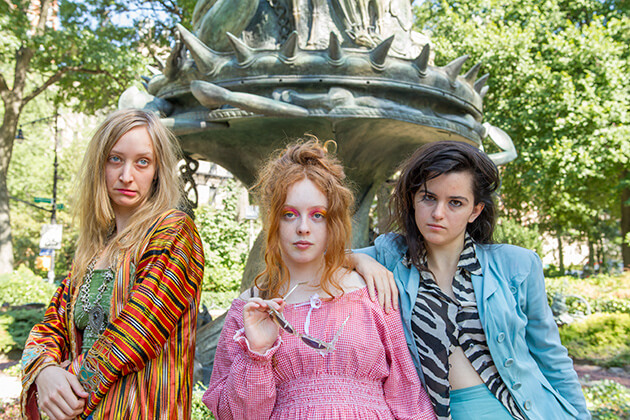

Allan’s ‘fascism of reality’ reminds me of the work of philosophers Theodor Adorno and Max Horkheimer, who wrote about the condition of post-modern language: Since language itself has become a public commodity in our time, only fragmentary writing and music—or, in Zhe Zhe‘s case, film making—can subvert it. By producing deformations, according to the philosophers, one discovers what is actually invariant or essential to the work.
In this sense, Zhe Zhe’s incoherence (at times) becomes an exploration: “Even though there is a narrative arc, in the end there’s always something that doesn’t get resolved,” says Hennessey. “I think we’re deliberately alienating the characters. The minute they start being relatable, they morph and become something nightmare-ishly two dimensional and not relatable.”
And “when we were doing the green screens,” she adds, “it really felt like putting layers of images over each other in a way that didn’t create a real space, in a way that created a very fake, very flat space.”
The effect is that, sometimes, Zhe Zhe can feel like watching a campy, exaggerated version of a typical night out in Bushwick—and this isn’t too far from the original intention: “I think when we started the show, we wanted certain elements to be like cartoons or anime,” says O’Hara, “and we’ve been talking about reinserting that into the next season.”
Hennessey adds, “The culture has changed so much in a year and a half in terms of art slash comedy, gender, DIY-film production, web series, and independent entertainment. Season one is very August 2015, so when we really start shooting season two, it needs to be at least August 2017. It needs to feel futuristic in that way.”
If Zhe Zhe is working with a crystal ball, I have no idea; it wasn’t on set during the interview. But, they’ve been “on the nose” (as Hennessey says) about where our culture, and Brooklyn especially, has been headed so far. Hopefully, the crystal ball works its magic again on season two.
Zhe Zhe is currently raising funds for season two and looking for a producer. You can follow them on Facebook here.
You might also like 














